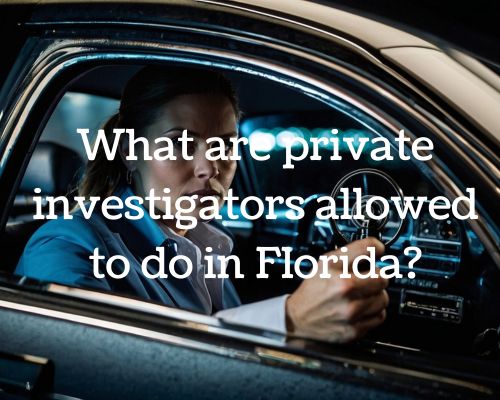Private investigators like in Ali Private Investigator Tampa, are hired to uncover information that may be difficult for the general public to obtain. They are often hired to investigate individuals, businesses, and other entities for various reasons.

In Florida, private investigators must adhere to strict regulations and guidelines set forth by the Florida Department of Agriculture and Consumer Services.
There are different types of private investigator licenses in Florida, including Class A, Class B, and Class C licenses. To obtain and maintain a Class C license, individuals must be employed by a licensed Class A or Class B private investigative agency.
Private investigators in Florida have certain rights and abilities when conducting investigations. For example, they are able to identify and confirm a Social Security Number, locate death, marriage, birth, bankruptcy, and divorce records, and research property holdings and mortgage information.
However, it is important to understand the legal limits of what private investigators can and cannot do to avoid breaking local or state laws and causing harm to the subjects under investigation.
Legal Framework and Licensing Requirements
Private investigators in Florida are regulated by the state’s Department of Agriculture and Consumer Services. The regulatory framework is governed by Chapter 493 of the Florida Statutes and the Florida Administrative Code.
Understanding Florida Statutes and Regulations
Private investigators in Florida must comply with the state’s laws and regulations governing their profession.
Chapter 493 of the Florida Statutes outlines the legal requirements for private investigators, including licensing, training, and ethical standards.
The Florida Administrative Code provides additional guidance on these requirements and outlines specific rules and regulations that private investigators must follow.
Licensing Process for Private Investigators
To become a licensed private investigator in Florida, you must submit an application to the Division of Licensing.
The application process requires you to provide personal information, employment history, and educational background. You must also pass a criminal background check and meet specific training requirements.
There are different types of licenses available for private investigators in Florida, including Class C, Class CC, and Class M licenses.
Class C licenses are for private investigators who have at least two years of experience, while Class CC licenses are for those who are in the process of gaining practical experience. Class M licenses are for private investigators who work for a licensed Class A agency.
Renewal and Continuing Education
Private investigators in Florida must renew their licenses every two years.
To renew your license, you must submit a renewal application, pay the renewal fee, and provide updated proof of insurance or bonding.
Additionally, private investigators must complete 14 hours of continuing education during each two-year renewal period.
It is important to maintain legal compliance with Florida statutes and regulations to avoid disciplinary action or license revocation.
The Department of Agriculture and Consumer Services, Division of Licensing, is responsible for enforcing these regulations and investigating complaints against licensed private investigators.
Scope of Work and Limitations
As a licensed private investigator in Florida, you have specific permissible investigative activities that you can undertake. However, you must also adhere to ethical standards and professional conduct, as well as privacy laws and restrictions. If you are looking for a reputable private investigator, go to Ali Private Investigator Tampa.
Permissible Investigative Activities
As a private investigator, you can conduct a variety of investigative activities, including but not limited to:
- Conducting background checks and pre-employment screening
- Investigating insurance fraud
- Locating missing persons
- Gathering evidence for civil and criminal cases
- Assisting law enforcement with gathering leads and additional information
Ethical Standards and Professional Conduct
As a private investigator, you must adhere to high standards of professionalism and ethical conduct.
You must operate within the legal boundaries and jurisdiction of your permit and certificate. You must also maintain confidentiality and credibility in all transactions and interactions with clients and the public.
Privacy Laws and Restrictions
Privacy laws and restrictions are a crucial aspect of private investigative work.
You must be aware of the legal aspects of privacy and the limitations of your investigative techniques.
You cannot trespass on private property or enter someone’s home without permission, regardless of the circumstances.
Surveillance activities typically occur in public spaces. Investigators adhere to strict guidelines to avoid infringing on privacy rights.
Additionally, you must follow the laws and regulations regarding wiretapping, bugs, hacking, and other invasive techniques.
In Florida, it is a two-party consent state. This means that all parties involved must consent to being recorded.